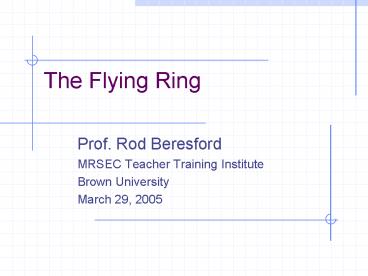The Flying Ring - PowerPoint PPT Presentation
1 / 12
Title:
The Flying Ring
Description:
Steel coat hangers. Materials properties at work in the flying ... The ring is designed to have very low resistance so that the induced current in it is large ... – PowerPoint PPT presentation
Number of Views:143
Avg rating:3.0/5.0
Title: The Flying Ring
1
The Flying Ring
- Prof. Rod Beresford
- MRSEC Teacher Training Institute
- Brown University
- March 29, 2005
2
Goals
- Basic electrical and magnetic properties of
materials - Elihu Thomsons historic demonstration of
induction - Understand how a relay works
3
Demonstration The Solenoid
A wire carrying electric current produces
magnetic forces, just like a permanent
magnet. Coiling lots of loops around a core
concentrates the the magnetic forces inside the
core
Making the core from a magnetic material (iron)
makes the forces stronger still The coil and the
iron core will attract each other just as two
magnets do
V
4
Elihu Thomson, 1853-1937
- American EE and prolific inventor (around 700
patents) - Founder of GE
- Demonstration of the motive power available from
electromagnetic induction gave impetus to the ac
electric power system 1887 in New York
5
Ring launcher
Steel coat hangers
Slotted iron core
Coil windings
www.coilgun.eclipse.co.uk/
- link
- http//www.fas.harvard.edu/scdiroff/lds/Electrici
tyMagnetism/RingFlinger/RingFlinger.html
6
Materials properties at work in the flying ring
demo
- The copper wire of the coil has a resistance to
electrical current flow, R, which varies in
proportion to the total length of wire and in
inverse proportion to the wire cross-sectional
area. - The alternating coil current causes an
alternating magnetization of the iron pipe and
steel coat hangers, which greatly increases the
total magnetic field - The coil has an inductance, L, that also impedes
the current flow, which varies in proportion to
the cross-sectional area of the core and in
inverse proportion to the length of the core. - The alternating magnetization in the core induces
voltage in any nearby conductors - The ring is designed to have very low resistance
so that the induced current in it is large - The iron pipe is slotted and the steel core rods
are coated to reduce the induced currents in
them, which would dissipate the energy of the
launch - Brown undergrads optimized the design of the coil
and ring and hit the ceiling in Prince Lab
(estimated throw height 8 meters)
7
Flying ring coil Bill of materials
8 length of ¾ O.D. iron gas pipe 1.46 26
Belden magnet wire (645 feet) 23.23 35
coated steel clothes hangers found in the
closet Extension cord 4.94 5 square of
plywood scrap from the shop Power strip with
reset borrowed from the office Pair of
alligator clips 2.00
CONTACT NEWARK INONE 1.800.4.NEWARK(1.800.463.92
75). This amount of wire would be enough for
five or six demo units.
8
Relay
- A switch that can be turned on and off by
electricity (instead of by a person) - Uses magnetic properties of materials and the
magnetic forces due to electric current flow
9
Inside a Relay
Magnetic force deflects the lever downward when
the coil is energized
Spring force restores the lever when the coil is
not energized
Normally closed contact
NC
Common contact
NO
Normally open contact
Connections to coil
10
Inside a Relay
Magnetic force deflects the lever downward when
the coil is energized
Spring force restores the lever when the coil is
not energized
Normally closed contact
NC
Common contact
NO
Normally open contact
Connections to coil
11
Inside a Relay
Magnetic force deflects the lever downward when
the coil is energized
Spring force restores the lever when the coil is
not energized
Normally closed contact
NC
Common contact
NO
Normally open contact
Connections to coil
12
Inside a Relay
Magnetic force deflects the lever downward when
the coil is energized
Spring force restores the lever when the coil is
not energized
Normally closed contact
NC
Common contact
NO
Normally open contact
Connections to coil

